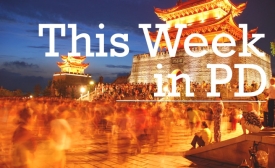germany

Can China's attempts at asserting its influence globally solidify its world power status?
Speaking at a Brookings Institution event in Washington, Schaeuble described the standoff with Russian President Vladimir Putin as a "new systemic conflict" that would be won by the side with greater "soft power" and a stronger economy.
Colourful mechanised lions, the cogwheel logo of Prime Minister Narendra Modi’s pet Make in India initiative, welcomed him from every corner of this German town on Sunday and underscored the agenda he would push in a country known the world over for its engineering and economy.
European powers struggling to hold together a stalled Ukrainian peace accord will resume talks with Russia and Ukraine in Germany next week as efforts shift from the battlefield to solving political disputes. European Union leaders say easing economic sanctions on Russia requires full compliance with the agreement negotiated in Belarus in February.
With the Asian Infrastructure Investment Bank (AIIB) coming into operation with the support of UK, France, Germany and such Western states and the BRICS Bank set to start off, China seems to have taken over the International Aid Regime.
The US State Department announced a drastic 50 percent funding cut for the Congress-Bundestag Youth Exchange program. At a time when our two countries need to work together more closely on numerous transatlantic and global issues, slashing this successful program is the wrong decision for German-American relations.
Germany is emerging, faster than it wanted, as a global diplomatic force. (...) Its new engagement is evident in the awe-inspiring stamina of Mrs Merkel’s diplomacy. In one recent week, she shuttled between Berlin, Kiev, Munich, Washington, Ottawa, Minsk and Brussels on consecutive days. In Minsk, as the picture shows, she negotiated through the night for more than 17 hours with four complicated men (the presidents of Ukraine, Russia, Belarus and France).
The 2014 CPD Annual Review demonstrates that although public diplomacy is present in every region of the world, it is predominantly in the northern hemisphere. North America is ranked the most active region in public diplomacy, with the United States contributing the most. Asia (Asia Pacific, Southeast Asia and Central Asia combined) comes in second, and Europe is third, with almost the same presence as Asia. As expected, China, Japan, and South Korea take the lead as the major actors in Asia Pacific. India is also very active in PD in South Asia.







